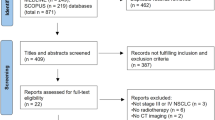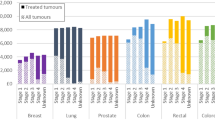Opinion statement
In the past two decades, multidisciplinary care has emerged as new way to manage cancer given the need to gather together specific areas of expertise and to discuss the variety of treatment approaches available for each patient. Of all the cancer subtypes, head and neck cancer might be considered one of the most valid areas, from an oncological point of view, for a multidisciplinary approach to be applied. Head and Neck Cancer is a complex disease area due to its varied histology and subsites, its numerous feasible treatments, its multiple typical comorbidities, and its treatment-induced toxicities whose management requires the simultaneous involvement of several professionals as part of the same health care team. However, the benefits of a multidisciplinary team approach in this particular area have not yet been properly documented in terms of survival outcomes. Moreover, there are some concerns and the limitations of a multidisciplinary team approach for Head and Neck Cancer patients are still open to question: cost-efficiency, the implications from a medical law perspective, the level of expertise required and the timing of each intervention (fixed or as required; before, during or after oncological treatment), and the role of the leader with other interested specialists to optimize all multidisciplinary care mechanisms.
Similar content being viewed by others
References and Recommended Reading
Papers of particular interest, published recently, have been highlighted as: • Of importance •• Of major importance
Pillay B, Wootten AC, Crowe H, Corcoran N, Tran B, Bowden P, Crowe J, Costello AJ. The impact of multidisciplinary team meetings on patient assessment, management and outcomes in oncology settings: a systematic review of the literature. Cancer Treat Rev. 2016;42:56–72. A comprehensive systematic review about the role of multidisciplinary team throughout all the patient’s journey in oncology
Licitra L, Bossi P, Locati LD. A multidisciplinary approach to squamous cell carcinomas of the head and neck: what is new? Curr Opin Oncol. 2006;18:253–7.
Giralt J, Benavente S, Arguis M. Optimizing approaches to head and neck cancer: strengths and weaknesses in multidisciplinary treatments of locally advanced disease. Ann Oncol. 2008;19(Suppl 7):vii195–9.
Prades J, Remue E, van Hoof E, Borras JM. Is it worth reorganising cancer services on the basis of multidisciplinary teams (MDTs)? A systematic review of the objectives and organisation of MDTs and their impact on patient outcomes. Health Policy. 2015;119:464–74.
Friedland PL, Bozic B, Dewar J, Kuan R, Meyer C, Phillips M. Impact of multidisciplinary team management in head and neck cancer patients. Br J Cancer. 2011;104:1246–8.
Tsai WC, Kung PT, Wang ST, Huang KH, Liu SA. Beneficial impact of multidisciplinary team management on the survival in different stages of oral cavity cancer patients: results of a nationwide cohort study in Taiwan. Oral Oncol. 2015;51:105–11.
Liao CT, Chen SJ, Lee LY, Hsueh C, Yang LY, Lin CY, Fan KH, Wang HM, Ng SH, Lin CH, Tsao CK, Chen IH, Chang KP, Huang SF, Kang CJ, Chen HC, Yen TC. An ultra-deep targeted sequencing gene panel improves the prognostic stratification of patients with advanced oral cavity squamous cell carcinoma. Medicine (Baltimore). 2016;95(8):e2751.
Bergamini C, Locati L, Bossi P, Granata R, Alfieri S, Resteghini C, Imbimbo M, Fallai C, Orlandi E, Tana S, Iacovelli NA, Guzzo M, Ibba T, Colombo S, Bianchi R, Pizzi N, Fontanella W, Licitra L. Does a multidisciplinary team approach in a tertiary referral centre impact on the initial management of head and neck cancer? Oral Oncol. 2016;54:54–7.
Wheless SA, McKinney KA, Zanation AM. A prospective study of the clinical impact of a multidisciplinary head and neck tumor board. Otolaryngol Head Neck Surg. 2010;143:650–4.
Patil RD, Meinzen-Derr JK, Hendricks BL, Patil YJ. Improving access and timeliness of care for veterans with head and neck squamous cell carcinoma: a multidisciplinary team's approach. Laryngoscope. 2016;126:627–31. This paper analyzes the impact of a multidisciplinary team approach on a timely access to head and neck cancer diagnosis and treatment start
Van Harten MC, Hoebers FJ, Kross KW, van Werkhoven ED, van den Brekel MW, van Dijk BA. Determinants of treatment waiting times for head and neck cancer in the Netherlands and their relation to survival. Oral Oncol. 2015;51:272–8.
Murphy CT, Galloway TJ, Handorf EA, Egleston BL, Wang LS, Mehra R, Flieder DB, Ridge JA. Survival impact of increasing time to treatment initiation for patients with head and neck cancer in the United States. J Clin Oncol. 2016;34:169–78. Excellent proof of the impact of time to treatment start on head and neck cancer patients’ prognosis
Lamb BW, Sevdalis N, Taylor C, Vincent C, Green JS. Multidisciplinary team working across different tumour types: analysis of a national survey. Ann Oncol. 2013;1293–1300.
National Institute for Clinical Excellence. Guidance on cancer services improving outcomes in head and neck cancers. The manual. London 2004.
Ansmann L, Kowalski C, Pfaff H, Wuerstlein R, Wirtz MA, Ernstmann N. Patient participation in multidisciplinary tumor conferences. Breast. 2014;23:865–9.
Washington KT, Parker Oliver D, Gage LA, Albright DL, Demiris G. A multimethod analysis of shared decision-making in hospice interdisciplinary team meetings including family caregivers. Palliat Med. 2016;30:270–8.
Bradley PJ, Zutshi B, Nutting CM. An audit of clinical resources available for the care of head and neck cancer patients in England. Clin Oncol. 2005;17:604–9.
Jalil R, Ahmed M, Green JS, Sevdalis N. Factors that can make an impact on decision-making and decision implementation in cancer multidisciplinary teams: an interview study of the provider perspective. Int J Surg. 2013;11:389–94.
Shah BA, Qureshi MM, Jalisi S, Grillone G, Salama A, Cooley T, Zaner K, Sakai O, Truong MT. Analysis of decision making at a multidisciplinary head and neck tumor board incorporating evidence-based National Cancer Comprehensive Network (NCCN) guidelines. Pract Radiat Oncol. 2015.
Hinther A, Nakoneshny SC, Dort JC, Chandarana SP, Matthews TW. Historical compliance rates for providing postoperative radiotherapy in oral cavity squamous cell carcinoma. Head Neck. 2016. doi:10.1002/hed.24464.
Ruhstaller T, Roe H, Thürlimann B, Nicoll JJ. The multidisciplinary meeting: an indispensable aid to communication between different specialities. Eur J Cancer. 2006;42(15):2459–62.
Bradley PJ. Multidisciplinary clinical approach to the management of head and neck cancer. Eur Arch Otorhinolaryngol. 2012;269:2451–4.
Riquet M, Mordant P, Henni M, Wermert D, Fabre-Guillevin E, Cazes A, Le Pimpec Barthes F. Should all cases of lung cancer be presented at tumor board conferences? Thorac Surg Clin. 2013;23:123–8.
Lamb BW, Green JS, Benn J, Brown KF, Vincent CA, Sevdalis N. Improving decision making in multidisciplinary tumor boards: prospective longitudinal evaluation of a multicomponent intervention for 1,421 patients. J Am Coll Surg. 2013;217:412–20.
Jalil R, Akhter W, Lamb BW, Taylor C, Harris J, Green JS, Sevdalis N. Validation of team performance assessment of multidisciplinary tumor boards. J Urol. 2014;192:891–8.
Wissinger E, Griebsch I, Lungershausen J, Foster T, Pashos CL. The economic burden of head and neck cancer: a systematic literature review. Pharmacol Econ. 2014;32:865–82. An interesting paper discussing the existing evidence on resource use and costs associated with the diagnosis and treatment of head and neck cancer
Ke KM, Blazeby JM, Strong S, Carroll FE, Ness AR, Hollingworth W. Are multidisciplinary teams in secondary care cost-effective? A systematic review of the literature. Cost Eff Resour Alloc. 2013;11:7. Review on the cost-effectiveness of a multidisciplinary approach in medicine according to the Consensus on Health and Economic Criteria
Fader DJ, Wise CG, Normolle DP, Johnson TM. The multidisciplinary melanoma clinic: a cost outcomes analysis of specialty care. J Am Acad Dermatol. 1998;38:742–51.
Hagiwara S, Mori T, Tuchiya H, Sato S, Higa M, Watahiki M, Hoshina M, Mochizuki T, Chiba T, Miwa A, Kawachi S. Multidisciplinary nutritional support for autologous hematopoietic stem cell transplantation: a cost-benefit analysis. Nutrition. 2011;27:1112–7.
Dorrian C, Ferguson J, Ah-See K, Barr C, Lalla K, van der Pol M, et al. Head and neck cancer assessment by flexible endoscopy and telemedicine. J Telemed Telecare. 2009;15:118–21.
Stalfors J, Bjorholt I, Westin T. A cost analysis of participation via personal attendance versus telemedicine at a head and neck oncology multidisciplinary team meeting. J Telemed Telecare. 2005;11:205–10.
Sidhom MA, Poulsen MG. Multidisciplinary care in oncology: medicolegal implications of group decisions. Lancet Oncol. 2006;7:951–4.
Sidhom MA, Poulsen M. Group decisions in oncology: doctors' perceptions of the legal responsibilities arising from multidisciplinary meetings. J Med Imaging Radiat Oncol. 2008;52:287–92.
Beswick DM, Vashi A, Song Y, Pham R, Holsinger FC, Rayl JD, Walker B, Chardos J, Yuan A, Benadam-Lenrow E, Davis D, Sung CK, Divi V, Sirjani DB. Consultation via telemedicine and access to operative care for patients with head and neck cancer in a veterans health administration population. Head Neck. 2016;38:925–9. The impact of telemedicine applied to head and neck cancer patients’ management
Head BA, Keeney C, Studts JL, Khayat M, Bumpous J, Pfeifer M. Feasibility and acceptance of a telehealth intervention to promote symptom management during treatment for head and neck cancer. J Support Oncol. 2011;9:e1–e11.
Head BA, Studts JL, Bumpous JM, et al. Development of a telehealth intervention for head and neck cancer patients. Telemed J E Health. 2009;15:44–52.
Acknowledgments
We gratefully thank Mr. Chris Botterill for his precious work in the linguistic review.
Author information
Authors and Affiliations
Corresponding author
Ethics declarations
Conflict of Interest
Paolo Bossi has received compensation from Roche, AstraZeneca, and Merck for service on advisory boards.
Salvatore Alfieri declares that he has no conflict of interest.
Human and Animal Rights and Informed Consent
This article does not contain any studies with human or animal subjects performed by any of the authors.
Additional information
This article is part of the Topical Collection on Head and Neck Cancer
Rights and permissions
About this article
Cite this article
Bossi, P., Alfieri, S. The Benefit of a Multidisciplinary Approach to the Patient Treated with (Chemo) Radiation for Head and Neck Cancer. Curr. Treat. Options in Oncol. 17, 53 (2016). https://doi.org/10.1007/s11864-016-0431-3
Published:
DOI: https://doi.org/10.1007/s11864-016-0431-3




